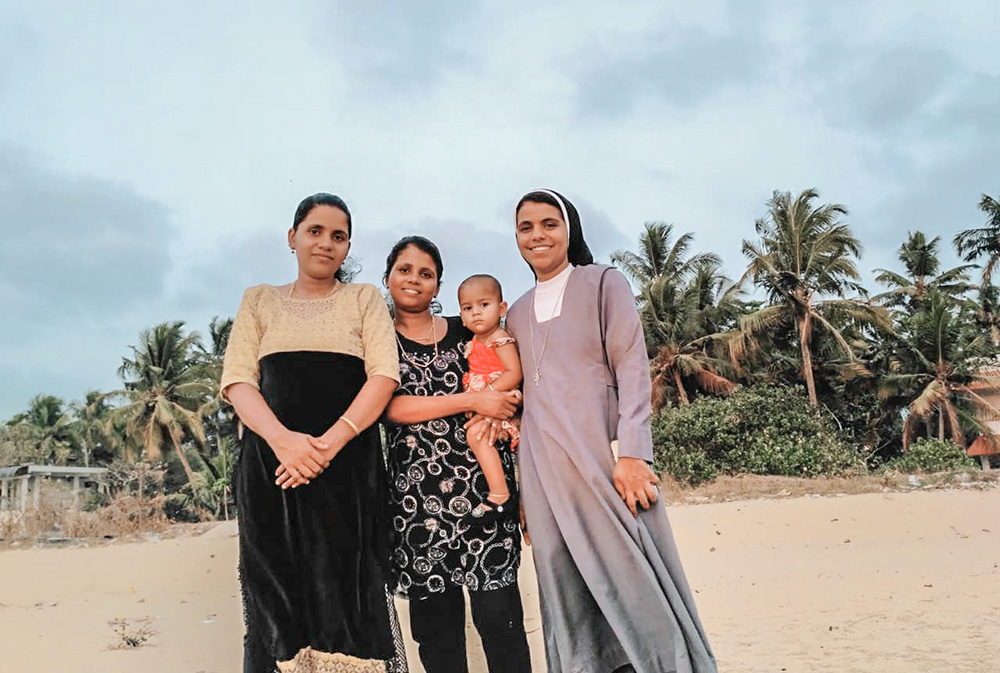
Augustinian Sr. Nidhisha Janson with her sisters at their beachside house. The siblings' parents are buried at the Church Cemetery, which is also facing eviction in Munambam, Kerala, India. (Courtesy of Nidhisha Janson)
Sr. Nidhisha Janson struggled to control her emotions while sharing her anxiety over her seashore village in the southwestern state of Kerala, claimed by a Muslim body.
"I cannot imagine someone snatching away our village. My parents who had toiled hard in the land and sea now sleep in the cemetery here," the 36-year-old nun said, as tears trickled down her cheeks.
The member of the Augustinian Sisters Servants of Jesus and Mary congregation is one of 17 nuns belonging to different congregations hailing from the village.
Janson is among hundreds of people on a hunger strike since Oct. 11 to save Munambam, a coastal village some 20 miles northwest of Kochi, Kerala's commercial capital.
Properties facing eviction in the village include Our Lady of Velankanni Church, locally known as Velankanni Matha Church; the Sisters of the Visitation convent, kindergarten and dispensary; and more than 600 Christian and Hindu families.
The Waqf Board, a Muslim body, has termed the properties as "the land belonging to Allah, the almighty." The Muslim body says the land in Munambam was donated to it by a Muslim family almost a century ago.
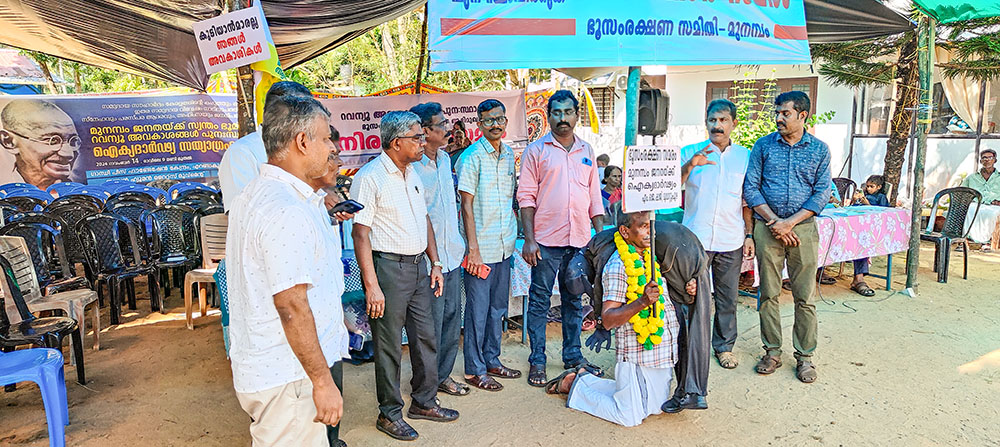
People from various parishes support the affected villagers by joining their hunger strike at the campus of the Velankanni Matha Church in Munambam, Kerala, India. (Thomas Scaria)
Waqf is an Islamic endowment of property held in trust and used for a charitable or religious purpose. The term waqf in Arabic means "confinement" or "prohibition."
Janson told Global Sisters Report on Nov. 25, "It is here I was born and grew up, playing in the sandy beach. My faith and vocation were nurtured in this very land."
Munambam, under the Kottapuram Diocese, is home of Velankanni Matha Church, the native parish of some 10 priests. The Passionists, an Italy-based men's congregation, manages the parish.
The parishioners and their Hindu neighbors take turns to sit inside a temporary shelter in the church campus to protest what they say is injustice meted out to them.
"Everyone sitting there has stories of fear and anxiety as they all have received eviction notices from the Waqf Board and the [the government] revenue department," Passionist Fr. Antony Thomas, the assistant parish priest of Munambam's Velankanni Matha Church, told GSR.
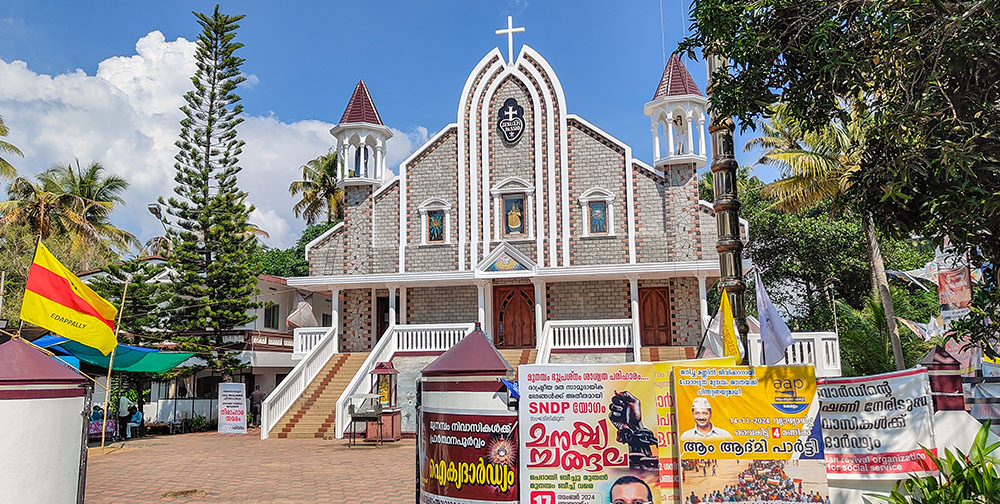
Our Lady of Velankanni Church, locally known as Velankanni Matha Church, has become a center of protests against the demands of the Waqf Board, which has claimed authority over some 600 families' land in Munambam, Kerala, India. (Thomas Scaria)
The protesters, he added, have lived in the village for at least three generations.
Visitation Sr. Metilda Lawrence, manager of the kindergarten adjacent to her convent in Munambam, said they joined the strike after the kindergarten received the eviction notice. However, her convent has yet to receive notice.
The protesters' demands were not addressed as the strike entered its 47th day on Nov. 26, despite the state government announcing a judicial commission to study the matter.
In 2019, the Waqf Board declared the land in Munambam as its property, and directed the government revenue department to stop accepting land tax from the current occupants.
The government overruled the decision in 2022, but the Muslim body challenged it in the Kerala High Court, which stayed the government order.
"We purchased this land around three decades ago and have been paying property taxes, but the revenue department refuses to accept taxes from 2020," said Lawrence, who also has managed a dispensary in the church campus for many years.

Visitation Sr. Metilda Lawrence at her convent explains about the crisis they face following the eviction notice. (Thomas Scaria)
The Waqf Board reportedly is the third largest landowner in India after the federal-government-controlled Defence and Railways departments.
As many as 32 Waqf Boards control 870,000 properties spanning 940,000 acres across India, with an estimated value of 1.2 trillion rupees (US$14.46 billion). More than 200 members control the land and properties pledged by the people for religious or charity purposes.
According to The Economic Times, several landmark properties in India face Waqf claims, and cases are in court.
Shelton Joseph, a Catholic lay leader in Munambam, disputed that the land belongs to the Waqf Board.
According to Joseph, Sattar Settu, a Muslim trader, had taken the property on lease from the king of Cochin in the 1920s. His son-in law, Muhammed Siddhique Sait, later donated the 400-acre seaside property to the Muslim management of Farook College in Kozhikode, some 100 miles north of Munambam.
Janson said her grandfather bought the land from the Muslim-managed Farook College.
Advertisement
Thomas Koonanmavunkal, a Munambam resident, told GSR that he faces eviction from his small plot of land and his house. "I wanted to take a loan for the education of my daughter, but no banks accepted our property as security," he lamented.
The Munambam parish priest said his villagers have received wide support from the Christian and Hindu communities in Kerala.
On Nov. 10, more than 1,000 churches in Kerala pledged support to the Munambam villagers, and several Catholics joined the strike at the church campus.
Sisters from Kerala joined the parishes to demand justice for the Munambam residents. They also organized special prayers seeking an amendment to the Waqf laws.
The Kerala Conference of Major Superiors, a wing of the national body of the Conference of Religious in India, has also pledged its support to the cause and several sisters and religious visited Munambam to empathize with the villagers.
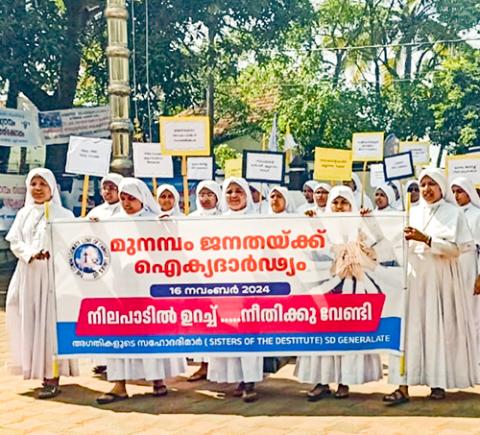
Sisters of the Destitute from Kochi, India, visited the affected people in a silent march after the Kerala Conference of Major Superiors issued a letter of support to the people in Munambam. (Courtesy of Antony Thomas)
Bethany Sr. Ardra Kuzhinapurathu, president of the Kerala Conference of Major Superiors, told GSR that the Muslim body's unjustified claim over the Munambam village is a "challenge to humanity, and we will stand with the poor fishermen community who are rightfully settled there."
St. Ann of Luzern Sr. Riti John, whose convent is also in Munambam, told GSR that their property is not listed in the Waqf claim. "But we have some sisters hailing from Munambam and also our relatives living there," said the superior of the convent.
Sr. Theramma Prayikalam, a member of the Medical Mission Sisters who have worked with the fishermen community for several decades, regrets that Kerala's political parties seem to exploit the Munambam issue.
"We empathize with the people of Munambam and look forward to a solution to their problem, but not happy about the way it becomes a political bargain," she told GSR Nov. 26.
She cautioned the church not to fall prey to the political parties, who want to make the dispute a sectarian issue.
Syro-Malabar Major Archbishop Raphael Thattil of Ernakulam-Angamaly urged the federal and state governments to intervene to resolve the issue.
"This is a humanitarian issue and must be addressed in a humane, democratic way, in accordance with the constitution," Thattil said.
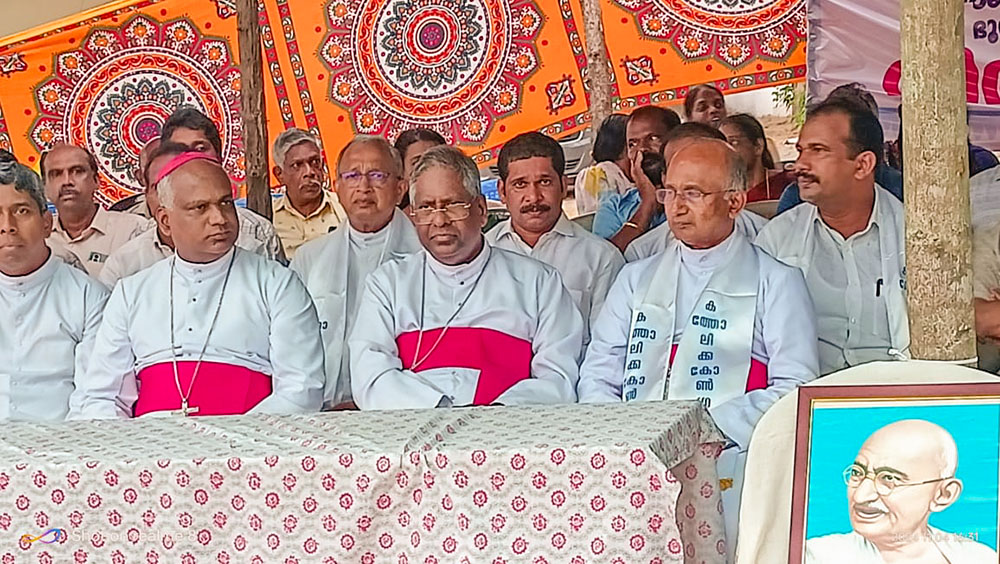
Bishops and other religious leaders visit Munambam and pledge their support to the fishermen whose houses received eviction notices. (Courtesy of Antony Thomas)
Archbishop Joseph Kalathiparambil of the Verapoly Latin Archdiocese said there was no evidence to suggest the land belonged to the Waqf Board and it has no right to claim it.
The parish priest said at least 21 bishops from various dioceses, both Catholic and other denominations, have visited his parish in the past month.
"One positive outcome of the crisis was that it brought together all the Christian denominations to give the best example of ecumenical experience," he added.
On Aug. 8, two bills — the Waqf (Amendment) Bill, 2024, and the Mussalman Waqf (Repeal) Bill, 2024, — were introduced in the Lok Sabha (lower house of parliament) with the aim to streamline the Muslim body's work and to ensure the efficient management of Waqf properties.
The federal government proposed a Waqf Amendment Bill 2024 that would limit the Muslim body's power to declare properties as its land.
The bill "gives us some hope," said Janson.





